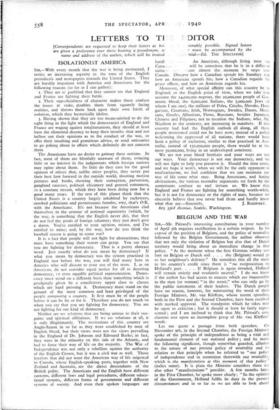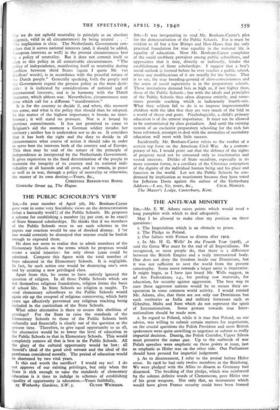BELGIUM AND THE WAR
SIR,—Mr. Pierard's interesting contribution in your number of April 5th requires rectification in a certain respect. In his exposé of the position of Belgium, and the policy of neutrality followed by the Belgian Government, the author observes that not only the violation of Belgian but also that of Dutch territory would bring about an immediate change in that policy. " At the moment when the first German soldier sets foot on Belgian or Dutch soil . . . she (Belgium) would go to her neighbour's defence." He considers this all the more to his country's credit since there is " no reciprocation on Holland's part. . . . If Belgium is again invaded, Holland will remain strictly and resolutely neutral." I do not know if the author has had access to sources which are inaccessible to the man (or woman) " in the street," who can only go by the public statements of their leaders. The Dutch people have no reason, however, for mistrusting the word of their Foreign Minister, Mr. van Kleffens, whose recent speeches, both in the First and the Second Chamber, have been received with marked approval. The standpoint which he takes may be open to criticism ; but it should at least be fairly repre- sented ; and I am inclined to think that Mr. Pierard's con- clusions rest upon an incomplete grasp of Mr. van Kleffens' words.
Let me quote a passage from both speeches. On November 9th, in the Second Chamber, the Foreign Minister spoke of the principle of independence as being a vital and fundamental element of our national policy ; and he made the following significant, though somewhat guarded, allusion to the nature of our present policy of neutrality and its relation to that principle when he referred to "our policy of independence and in connexion therewith our neutrality, which is the manifestation at this moment of that policy" (italics mine). It is plain the Minister considers there are also other " manifestations " possible. A feW months later, in the First Chamber, he spoke more clearly: " In the opinion of the Government, Holland fulfils its duty in the present circumstances and in so far as we are able to look ahead (for we do not uphold neutrality in principle as an absolute exigency, valid in all circumstances) by being neutral . . The implication is clear. The Netherlands Government con- siders that It serves national interests (and, it should be added, European interests as well) in the present circumstances best by a policy of neutrality. But it does not commit itself to stick to this policy in all conceivable circumstances. " The policy of independence, manifesting itself as neutrality during conflicts between third States (again I quote Mr. van Kleffens' words), is in accordance with the peaceful nature of The Dutch people." Generally speaking, both the people and the Government regard the present -policy as the most desir- able: it is indicated by considerations of national and of international interests, and is in harmony with the Dutch character, which abhors war. Nevertheless, circumstances may arise which call for a different "manifestation."
It is for the country to decide if, and when, this moment has come, and what is the policy that should then be adopted. In this matter of the highest importance it brooks no inter- ference ; it will stand no pressure. Nor is it bound by previous commitments. It has not promised to come to Belgium's aid the moment a German soldier invades her territory ; neither has it undertaken not to do so. It considers that it has both the right and the duty to decide in all circumstances what course of action it should take in order to serve best the interests both of the country and of Europe. This then may be said of the nature of the principle of independence as interpreted by the Netherlands Government. It gives expression to the fixed determination of the people to maintain the integrity of its country and its national indi- viduality at all hazards and all costs, and to remain, in peace as well as in war, through a policy of neutrality or otherwise, the master of its own destiny.—Yours, &c.,











































 Previous page
Previous page